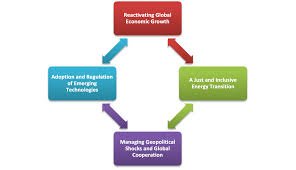As we enter 2025, several political issues are having a profound impact on the global stage. These issues are influencing policy decisions, economic stability, international relations, and social progress. Understanding the key political issues of today is crucial for anyone looking to stay informed about the future direction of the world. This article explores the most pressing political matters that will shape global affairs in 2025.
1. Climate Change and Environmental Policy
Climate change continues to be one of the most urgent political issues worldwide. As the effects of global warming become more evident, governments are under increasing pressure to take bold action to mitigate environmental damage. In 2025, the global focus on reducing carbon emissions, promoting renewable energy, and addressing environmental inequalities will intensify.
Why It’s Shaping the World:
-
International agreements: Countries are aiming to meet the targets set by the Paris Agreement, with more emphasis on reducing emissions.
-
Sustainability goals: Governments are prioritizing green energy policies, sustainable infrastructure, and carbon-neutral commitments to combat climate change.
2. Global Economic Stability and Inflation
Economic challenges, including rising inflation, unemployment, and supply chain disruptions, continue to dominate political agendas worldwide. In 2025, policymakers are grappling with balancing economic recovery, debt management, and social welfare programs. Rising inflation and the economic repercussions of global conflicts are creating further political debates about fiscal policy and global economic recovery.
Why It’s Shaping the World:
-
Global inflation: Many countries face inflationary pressures, which influence interest rates, wages, and consumer purchasing power.
-
Post-pandemic recovery: Nations are working to recover from the economic downturn caused by COVID-19, with government spending and stimulus packages playing a key role.
3. Geopolitical Tensions and International Relations
In 2025, geopolitical tensions remain high, with rising power struggles between global superpowers. The U.S., China, Russia, and the European Union continue to navigate complex relationships. Trade wars, military tensions, and international conflicts are influencing foreign policies, alliances, and the global economy. Issues such as territorial disputes, cybersecurity, and influence in global institutions are at the forefront of international relations.
Why It’s Shaping the World:
-
U.S.-China rivalry: Tensions between the U.S. and China, particularly over trade and technological advancements, continue to affect global stability.
-
Russian influence: Russia’s actions in Ukraine and its impact on European security remain a critical geopolitical concern.
4. Healthcare Access and Global Health Initiatives
The global health landscape is still being shaped by the ongoing response to the COVID-19 pandemic and the challenges posed by other infectious diseases. In 2025, political debates surrounding healthcare access, vaccine distribution, and the funding of health systems are driving international cooperation and policy changes. Health inequalities, particularly in developing countries, remain a critical issue in global politics.
Why It’s Shaping the World:
-
Universal healthcare access: Countries are working to improve their healthcare systems to ensure wider access to care and reduce inequalities.
-
Global health security: International efforts are focused on preparedness for future pandemics, with increased funding for vaccine research and healthcare infrastructure.
5. Human Rights and Social Justice Movements
Human rights remain a central issue in global politics. In 2025, political leaders are under pressure to address systemic inequality, racial justice, gender equality, and the protection of marginalized communities. Social justice movements are growing, advocating for the rights of refugees, ethnic minorities, and LGBTQ+ communities. Governments are being held accountable for their human rights records, both domestically and internationally.
Why It’s Shaping the World:
-
Racial justice: Movements for racial equality, particularly in the U.S., Europe, and Africa, continue to influence political platforms and elections.
-
LGBTQ+ rights: As global recognition of LGBTQ+ rights increases, political discourse focuses on equality, non-discrimination, and same-sex marriage.
6. Migration and Refugee Crises
Migration remains a pressing political issue, with millions of people displaced due to conflict, climate change, and economic instability. In 2025, migration policies are under scrutiny, with debates focusing on border security, refugee rights, and international cooperation on asylum seekers. Countries must find a balance between security concerns and humanitarian obligations.
Why It’s Shaping the World:
-
Refugee resettlement: Nations are working to resettle refugees from war-torn regions while addressing domestic political concerns around migration.
-
Climate refugees: Rising sea levels and natural disasters are creating new migration patterns, requiring international responses.
7. Technological Regulation and Cybersecurity
As technology continues to advance, political leaders are facing new challenges regarding data privacy, artificial intelligence (AI), and digital security. The regulation of tech giants, the ethical use of AI, and the protection of citizens from cyber threats are key areas of focus. In 2025, governments will need to balance innovation with privacy and security concerns.
Why It’s Shaping the World:
-
Tech regulation: Governments are pushing for stronger regulations on data privacy, online platforms, and tech monopolies.
-
Cybersecurity threats: Cyberattacks continue to rise, threatening national security and corporate integrity, prompting new policy responses.
8. Education Reform and Access to Learning
Access to education and the reform of global education systems are critical political issues in 2025. Many countries are looking at ways to improve education accessibility, especially for disadvantaged groups, and to prepare future generations for the digital economy. In some regions, there are also calls for the decolonization of educational curricula.
Why It’s Shaping the World:
-
Digital learning: The shift to online education, accelerated by the pandemic, has led to a new era of digital classrooms and learning technologies.
-
Educational inequality: Efforts to close the education gap between rich and poor, and between urban and rural areas, are central to political agendas.
9. Energy Transition and Sustainability
In 2025, the global push for renewable energy solutions is intensifying as nations look to reduce their carbon footprints and tackle the climate crisis. The transition from fossil fuels to sustainable energy sources like wind, solar, and hydrogen will continue to shape political and economic decisions. Energy security, combined with efforts to combat climate change, is now a primary focus for governments worldwide.
Why It’s Shaping the World:
-
Energy independence: Nations are looking for ways to achieve energy security and reduce dependence on fossil fuels.
-
Global agreements: International cooperation on carbon reduction and energy sustainability is crucial in meeting climate goals.
10. Populism and Political Polarization
Populism continues to be a dominant political force in many countries. In 2025, political polarization is increasing, with stark divides between left-wing and right-wing ideologies. Populist leaders are gaining influence by capitalizing on economic discontent, nationalism, and anti-establishment sentiments. This trend is reshaping national politics and international relations.
Why It’s Shaping the World:
-
Rise of populist leaders: Populism is reshaping political landscapes in countries like the U.S., Brazil, and Hungary, influencing policy decisions and global relations.
-
Political instability: The growing divide between political factions is leading to greater instability in several regions.
Conclusion
The political issues shaping the world in 2025 are complex and interconnected. From the urgent need to address climate change and migration to the regulation of technology and global health, the challenges are immense. However, with cooperative efforts, innovative solutions, and a focus on human rights and sustainability, there is hope for progress. As these issues evolve, they will continue to influence the global political landscape for years to come. Staying informed and engaged with these key topics is essential for understanding the future direction of our world.


